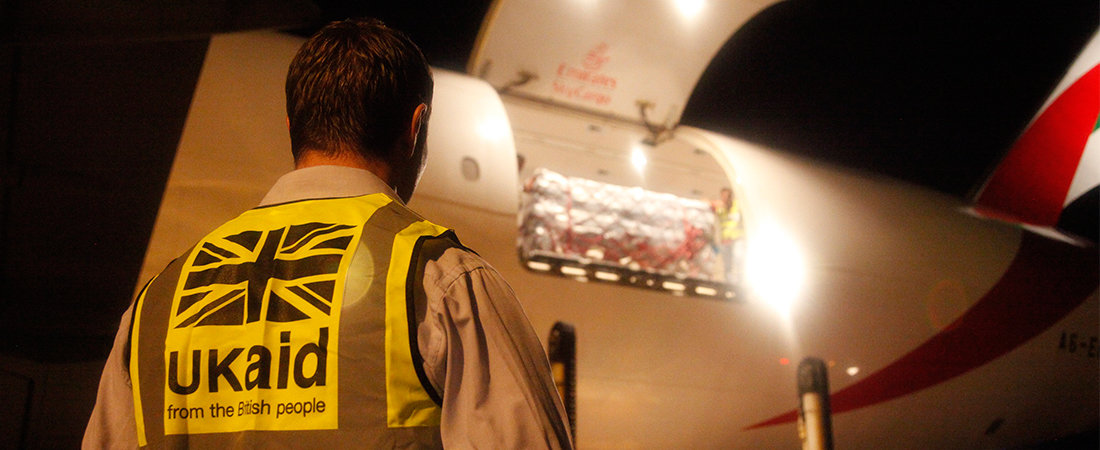The opening days of an unexpected UK General Election produced an unexpected focus: the UK’s aid budget.
As speculation grew last week that the aid budget would be trimmed, a counter campaign to show the value of the UK’s aid programme found its voice. On Friday, the Prime Minister said the commitment to spending 0.7% of national income on aid “will remain”, while also adding that it must be spent “in the most effective way”. More on that below.
First, some context. Since 2010, the UK’s international development budget has been “ring fenced” – protected from the cuts which other parts of UK government spending have seen. The former Prime Minister, David Cameron, was the key figure behind this commitment, supported by the International Development Secretary from 2010-2012, Andrew Mitchell.
During the coalition years the budget not only grew, but the UK enshrined the spending target of 0.7% of gross national income in law, becoming the first G7 economy to do so.
A growing budget at a time of austerity was a trigger for scrutiny, challenge and often heavy criticism of “foreign aid” from some media outlets and backbench Conservative MPs, who questioned not only the wisdom of spending targets, but also the effectiveness of aid programmes themselves. The Daily Mail, for example, has campaigned long and hard for the aid budget to be cut. Over the same period, the huge humanitarian need around the conflict in Syria grew, and the UK led the response to Ebola in Sierra Leone.
At the 2015 election the Conservatives maintained the commitment to retain the 0.7% spending target and to increase the aid budget, despite growing calls for a rethink. The Department for International Development (DFID) spends the lion’s share of the aid budget, and it has become the target of growing challenge and focus.
When Theresa May became Prime Minister last summer, many thought things would change and the budget might be reduced. It hasn’t happened, and the PM has now nipped the latest bout of election-induced speculation in the bud.
What drove the decision? Theresa May has talked of this being the right thing to do, supporting those who need it most. Some Conservatives have argued that development is morally the right thing to do. There are two other reasons. The first, of course, is the event which has turned UK politics and government on its head: Brexit.
The UK’s aid programme is highly respected around the world and DFID is seen as a leader in development. Aid is one of the UK’s foremost soft power levers. Being an “aid superpower” helps counter the charge that Britain is somehow looking inwards and retreating from the world stage. The UK’s Foreign Office, for example, uses the Global Britain hashtag to make its case about the UK’s global commitments to the world via social media.
The other reason is the powerful alliance of pro-aid voices who have made a compelling case for the value and effectiveness of UK development spending. Since Theresa May fired the election starting gun, Bill Gates has been in the UK setting out that case in clear terms: how UK aid is, in fact, good for Britain. In Washington last week, World Bank President Jim Yong Kim also warned against cutting the budget.
A strong and vocal group of NGOs also joined the fray. These groups have mainly avoided public criticism of the Government since 2010, but, seeing that a cut could be on its way, they turned up the volume on calls for the UK to hold firm to its commitment to support the world’s poorest people. Such organisations have highly engaged and motivated supporters, and can fill the postbags of members of parliament like few others can.
So the PM’s early aid commitment means the heat may go out of the debate – for now. But how the budget is spent, and who gets to spend it, may still change. A hint may be found in the desire to spend the budget “in the most effective way”. Various options can be found. The UK could push for a change to the international rules around the definition of what counts as aid. Other parts of Government – the Foreign Office, the Home Office, the Ministry of Defence – may see their slices of the aid pie get bigger. NGOs will argue against what they as any “securitisation” of aid, and also any future attempt to tie aid to trade. There may be less focus on “traditional aid” – health, education, water and sanitation programmes – and more on economic development, on migration, and disease prevention. This trend is already happening; it may now be speeded up, and talked up.
NGOs and others are currently encouraging those writing the relevant manifesto passages to maintain the current approach, keeping DFID’s central role, and sticking with the existing rules.
The Times, in an editorial last week, called the 0.7% budget figure “a political liability”. For this election, the aid debate may have peaked, but in the longer term it will continue to provoke passions.

